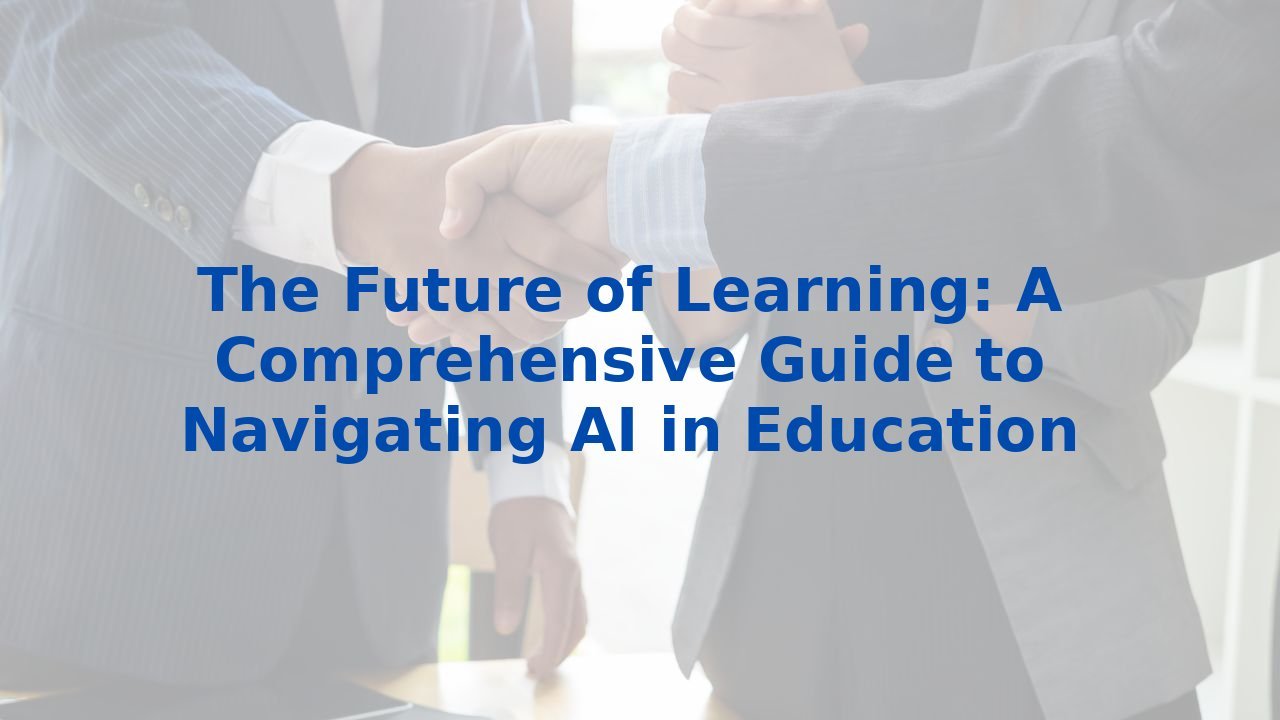The Future of Learning: A Comprehensive Guide to Navigating AI in Education
The Future of Learning: A Comprehensive Guide to Navigating AI in Education
Introduction
Education is an ever-evolving field, and at its core lies the goal of preparing individuals to engage with the world in meaningful ways. In this digital age, artificial intelligence (AI) is not just an addition; it's a revolution. It reshapes how we teach, learn, and engage with knowledge. As Robert M. Hutchins once said, "The object of Education is to prepare the young to educate themselves throughout their lives." AI is indeed a key player in this mission, ensuring that education becomes more personalized, efficient, and accessible than ever before.
Personalized Learning
The most profound impact of AI in education is its ability to provide personalized learning experiences. Traditional education often adopts a one-size-fits-all approach, which can lead to disengagement and frustration. However, AI can analyze student performance in real-time, adjusting the learning materials, pace, and difficulty according to individual needs. This tailored experience not only empowers students to master their subjects but also nurtures a love for learning by catering to their unique strengths and weaknesses.
Enhancing Administrative Efficiency
Educators wear many hats, and administrative tasks can often become a significant drain on time and resources. Here, AI serves as a strategic partner by automating essential but tedious tasks such as grading assignments and managing class schedules. By taking over these responsibilities, educators can redirect their focus toward what truly matters: mentoring and engaging with students. This not only enhances the learning experience but also enables institutions to operate with greater efficiency.
Accessibility for All
Education should know no boundaries. With AI, we can redefine accessibility in meaningful ways. Digital textbooks can be enriched with features like sign-language videos, interactivity, audio descriptions, and text-to-speech conversion, leveling the playing field for students regardless of their backgrounds. By ensuring that high-quality educational resources are available to everyone, AI promotes inclusive learning environments where every student can thrive.
Continuous Assessment and Feedback
Feedback is vital for growth, and AI facilitates real-time assessment, allowing educators to provide immediate insights into student performance. With AI’s capacity to identify areas where students struggle, teachers can tailor their strategies to meet specific needs. This proactive approach fosters a culture of continuous improvement, making learning adaptive rather than reactive.
Predictive Analytics for Early Intervention
One of the more intriguing capabilities of AI is predictive analytics. Educational institutions can harness this power to identify students who may be at risk of underperforming or dropping out. With early insights gained from AI, targeted interventions can be implemented, ensuring that support reaches those who need it most. This approach not only safeguards against educational inequities but also upholds the integrity of the learning environment.
Ethical Considerations in AI Implementation
While the benefits of AI in education are compelling, the ethical implications cannot be overlooked. The potential for bias in AI algorithms, as well as concerns over data privacy, must be addressed with rigor and sensitivity. It’s crucial for educational institutions to blend AI applications with traditional teaching methodologies, creating a balanced approach that mitigates risks. Moreover, continuous professional development and training for educators are vital for fostering ethical AI practices.
The Importance of Employee Training
To maximize the potential of AI in education, it’s essential that educators receive tailored training to navigate this landscape effectively. This includes comprehensive education on the available tools and the ethical frameworks surrounding their usage. By equipping educators with the skills to implement AI responsibly, we pave the way for a future where both educators and students can thrive in an AI-enhanced world.
Conclusion
The integration of AI into the fabric of education is a transformational journey. By fostering personalized experiences, enhancing operational efficiency, and ensuring accessibility for all, AI truly revolutionizes how we interact with knowledge. However, with great power comes great responsibility; thus, educators must be prepared to manage the ethical implications that accompany AI adoption. As we continue to explore and refine this technology, one truth remains clear: AI is here to reshape the future of education, paving the way for generations to come to educate themselves throughout their lives.
“The secret of change is to focus all of your energy, not on fighting the old, but on building the new.”



